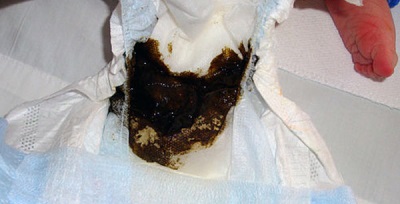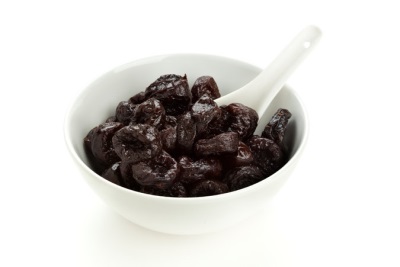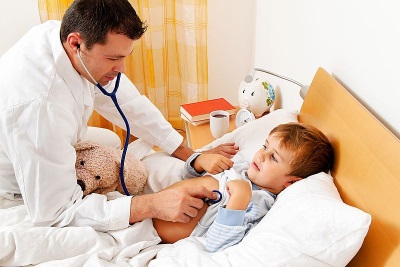Black feces in a child
If the baby's fecal masses suddenly become very dark, almost black, this will not remain unnoticed by the parents. What are the reasons for such a change in the color of baby stool?
What can be connected with?
The black color of the stool can be a symptom of serious diseases of the digestive system, but there are also non-dangerous causes of this coloration. It is also important to note that the black color for the baby’s chair immediately after birth is completely normal. This chair is called meconium.
Harmless reasons
Acquisition of black feces may be caused by the use of prunes, blueberries, dark grapes, blackberries, cherries, pomegranates, beets and other products.
Black grains
If you notice inclusions of a different form of black color in the fecal masses, then most often these are food debris that are not digested in the children's intestines. In the form of black dots, fragments of the skin and seeds of grapes, currants, raspberries and other food may be emitted from the child’s feces.
Worms, strings, streaks
Inclusions in fecal masses that look like black worms may appear due to the use of bananas. Such inclusions are often perceived by adults as worms, but in reality there are no black worms (almost always white or yellowish worms).

Iron preparations, activated carbon
The cause of the black stool are medicinal substances containing iron. It can be either iron supplements or vitamins or dietary supplements, which include this element. In artificial children, black color of feces can cause mixtures with a large amount of iron. Also black color takes the chair of a child who was given activated charcoal.
Among the drugs that can cause black stool, can also be called drugs that reduce blood clotting, and anti-inflammatory drugs. By themselves, they do not change the color of the stool, but can cause internal bleeding, manifested by black diarrhea.
Good reasons
One of the most dangerous reasons for the acquisition of black feces is internal bleeding from one of the sections of the digestive tract. Discharge with such bleeding looks like black diarrhea. The blood that is released from the esophagus and other parts of the gastrointestinal tract, changes color under the influence of intestinal bacteria and enzymes. Pathology is manifested not only by the black color of the stool, but also by dizziness, weakness, pallor.
With blood
If the baby has a black stool in which there is blood, this can be a symptom of some serious bowel pathologies (for example, Crohn's disease). With this type of feces, you must call a doctor.
After operation
Postoperative black feces may indicate open internal bleeding.
Temperature and black and green
Such symptoms are characteristic of intestinal infection and are also accompanied by nausea and abdominal pain.
Grey colour
This color of feces often appears after the introduction of a new mixture in the diet of the tiny artificial artist.Also, a grayish tint is characteristic of the stools of babies receiving undiluted cow's milk. Some complementary foods and medicines can also cause this shade of feces.

The gray color of diluted feces is characteristic of rotavirus infection, which, along with diarrhea, is manifested by fever and abdominal pain. In addition, the light gray color of feces is possible with pathologies of the liver and pancreas.
What to do?
Noticing the darkening of the child’s feces, it is necessary to analyze what foods, medicines and beverages the baby has consumed in recent days. If the food, which the child eats, was familiar, and the parents could not give the baby medicines that could change the color of the stool, you should immediately consult a doctor.
If there were products in the child’s menu that could affect his stool, or a crumb took medicines with coloring properties, watch the child for one or two days.

In the case when black feces are excreted longer than two days or such a change in the color of feces is repeated from time to time, it is necessary to go to the pediatrician with the child.
It is also important to immediately call the doctor if the baby has fever at the same time as the black feces appear, there is vomiting, weakness, abdominal pain and other adverse symptoms.







